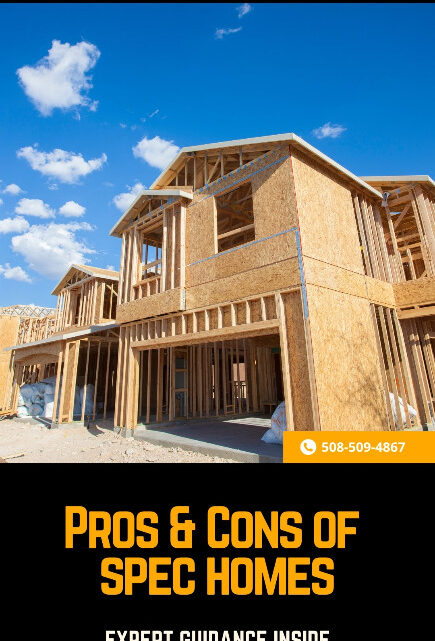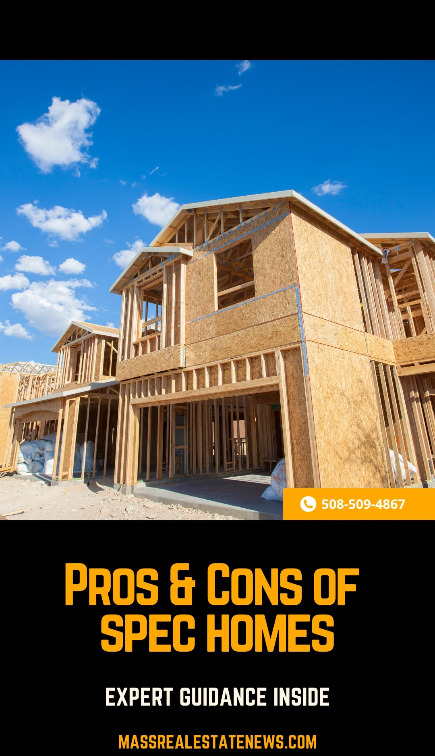Spec houses vs. custom homes – which is better?
Spec homes and custom-built homes are two standard options for house construction. Spec homes, planned and designed by builders, offer convenience and cost savings, allowing customers to choose by simply viewing models.
On the other hand, custom-built homes provide personalized designs and adjustments to suit individual preferences. Understanding the pros and cons of spec and custom-built homes is essential in making an informed decision.
There is a significant amount of research involved when buying new construction. Knowing the builder’s performance history will be vital, including delivering on time and fixing any issues.
From experience as a Realtor working with new homes for many years, skipping due diligence is a significant mistake.
What Is a Spec Home?
Speculative housing is a type of home planned and designed by builders. These builders purchase a plot of land and construct ready-to-move-in homes without having a specific buyer in mind. Maximum Real Estate Exposure is an excellent resource for defining speculative properties.
Spec homes are built based on the assumption that there will be demand for them in the real estate market.
Key Features of Spec Homes
Spec homes have certain distinct features that differentiate them from custom-built homes. These features include:
- Pre-designed floor plans: Spec homes come with pre-designed floor plans that are carefully crafted to appeal to a wide range of potential buyers.
- Standardized fixtures and finishes: To streamline the construction process, spec homes often incorporate standardized fixtures and finishes that are popular and in demand.
- Quick construction timeline: Spec homes are typically built faster than custom-built homes since the builders aim to minimize construction time and costs.
Benefits of Buying a Spec Home
There are several advantages to purchasing a spec home, including:
- Convenience: Spec homes offer convenience as buyers can move into a ready-to-occupy house without extensive planning and construction.
- Cost savings: Since spec homes are built in bulk, builders can obtain discounts on materials, allowing them to offer the houses at a potentially lower price compared to custom-built homes. Always compare home building costs and what you get for your money.
- Opportunity to see the finished product: Buyers have the advantage of physically seeing the house before making a decision, as spec homes are often completed or near completion at the time of purchase.
Considerations Before Purchasing a Spec Home
Before purchasing a spec home, there are a few factors to consider:
- Limited customization: Spec homes typically offer fewer customization options than custom-built homes. Buyers should know they may need to compromise on specific design elements.
- Lack of exclusivity: As spec homes are built in a community or development, the houses may have similarities in design and location. Buyers who seek uniqueness and individuality may prefer a custom-built home.
- Prompt decision-making: Spec homes often have multiple interested buyers, so it is crucial to be prepared to make a timely decision to secure the desired house.
Custom Built Homes: A Personalized Option
A custom-built home offers a personalized option for those seeking a residence tailored to their preferences and needs. We will explore the concept of custom-built houses and highlight their advantages to homeowners.
Before building a home, factors are also discussed to ensure a well-informed decision.
Understanding the Concept of Custom Built Homes
A custom-built home is a unique property carefully designed and constructed according to the homeowner’s specifications. Unlike spec homes, which are pre-designed by builders, custom homes provide the opportunity to create a living space ideally suited to individual tastes and lifestyles.
Custom-built housing involves working closely with architects and builders to transform ideas and visions into reality. Homeowners can choose every aspect of their home, from the architectural style and layout to the most minor design details and finishes.
Advantages of Choosing a Custom-Built House
There are several advantages to selecting a custom-built home:
- Complete Personalization and Design Control: Homeowners can personalize every aspect of their living space with a custom home. From the number of rooms and the layout to the choice of materials and finishes, homeowners can create a home that reflects their style and preferences.
- Energy-Efficient and Sustainable Options: Custom home builders often prioritize incorporating energy-efficient features and sustainable building materials. This ensures the home is environmentally friendly and offers long-term cost savings through reduced energy consumption.
- Ability to Monitor Material Quality: Homeowners can choose the quality of materials used in their custom home. They can select durable, high-quality materials that align with their preferences and budget, ensuring a well-built and long-lasting residence.
Factors to Consider Before Building a Custom Property
Before committing to building a custom home, it is essential to consider the following factors:
- Location and Land: Finding a suitable plot of land in the desired location can be challenging. Homeowners must assess the land’s availability, size, and suitability before proceeding with the custom home project.
- Potential for Unexpected Expenses: Building a custom home involves various expenses, and unforeseen costs may arise during construction. Homeowners must anticipate these potential expenses and plan accordingly to avoid financial surprises.
- Time-Intensive Construction Process: Custom homes typically require more time to complete compared to spec homes. Homeowners should be prepared for the extended construction timeline and understand that patience will be necessary during the building process.
By carefully considering these factors, homeowners can make an informed decision and determine if a custom-built home is the right choice for them.
Pros and Cons of Spec Homes
Spec homes offer a range of advantages and disadvantages for potential buyers to consider. It’s essential to weigh these factors carefully before making a decision.
Pros of Spec Homes
- Simplified Home Buying Process: Purchasing a spec home eliminates the need for extensive planning and decision-making associated with custom builds. Buyers can simply choose from existing models.
- Potential Cost Savings: Spec homes are often more affordable than custom-built homes because builders purchase materials in bulk and optimize construction processes.
- Opportunity to See the Finished Product: Buyers have the advantage of touring the completed spec home before making a purchase, giving them a clear idea of the layout, design, and overall quality.
Cons of Spec Homes
- Limited Customization Options: Unlike custom-built homes, spec homes offer limited flexibility in design and customization. Buyers have to choose from the existing features and finishes the builder provides.
- Lack of Exclusivity in Design and Location: Spec homes are often part of more significant developments, which means the design and location may lack the uniqueness and individuality that some buyers prefer.
- Potential Risks in Not Responding in Time: Spec homes are in high demand, and buyers must quickly secure their desired property. Delaying a decision may result in losing out on the opportunity.
Choosing a spec home or custom build depends on individual preferences, budget constraints, and time considerations. Carefully evaluate these pros and cons to determine the best option for your needs.
Pros and Cons of Custom-Built Homes
Custom-built homes allow homeowners to create a personalized living space tailored to their needs and preferences. While there are numerous advantages to building a custom home, it is also essential to consider potential drawbacks.
Here, we explore custom-built homes’ pros and cons.
Pros of Custom-Built Homes
Complete Personalization and Design Control
One of the significant benefits of custom-built properties is the ability to have complete personalization and design control. Homeowners can choose the layout, architectural style, and specific features that align with their vision. From selecting the floor plan to deciding on finishes, every detail can be customized, resulting in a home that truly reflects their individuality and lifestyle.
Energy-Efficient and Sustainable Options
Another advantage of custom-built homes is the opportunity to incorporate energy-efficient and sustainable options. Homeowners can choose environmentally friendly materials and energy-efficient appliances and implement green building practices to reduce their carbon footprint and save on utility costs in the long run. This allows for greater control over energy consumption and a more eco-friendly living environment.
Ability to Monitor Material Quality
Building a custom home provides the advantage of monitoring the quality of materials used during construction. Homeowners can work closely with builders and suppliers to ensure that only high-quality materials are used, resulting in a durable and long-lasting home. This added control over material selection contributes to homeowners’ satisfaction and peace of mind.
Cons of Custom-Built Homes
Challenges in Finding Suitable Land
One potential challenge of custom-built residences is finding suitable land to build on. The availability of land in desired locations may be limited, requiring homeowners to search extensively or settle for less favorable locations. This can add time and effort to the homebuilding process and may require compromise regarding location preferences.
Potential for Unexpected Expenses
Custom properties often come with the potential for unexpected expenses. As homeowners incorporate personalized design elements and unique features into their homes, costs can escalate beyond the initial budget.
It is crucial for homeowners to carefully plan and budget for these potential expenses to avoid financial strain or delays during the construction process.
Time-Intensive Construction Process
Building a custom home generally takes more time than purchasing a spec home. The customization and design process, obtaining necessary permits, and coordinating with builders can result in a longer construction timeline. Homeowners should be prepared for potential delays and the need for patience throughout the construction process.
When considering a custom-built house, weighing these pros and cons is crucial to make an informed decision. While creating a one-of-a-kind living space offers numerous benefits, it is essential to account for the potential challenges and considerations that come with building a custom home.
Making the Decision: Spec Home or Custom Build?
Deciding between a spec home and a custom build is an essential step in the home-buying process. It requires careful assessment of your needs, preferences, location, and timing considerations, financial and budget constraints. By evaluating these factors, you can make an informed decision that aligns with your vision of an ideal home.
Assessing Your Needs and Preferences
The first step in making this decision is to assess your needs and preferences. Consider your lifestyle, family size, and long-term goals. Think about the features and layout that are essential for your daily life.
Are you looking for specific architectural styles or unique design elements? You can establish a clear direction for your home search by identifying your must-haves and deal-breakers.
Factors to Consider in Location and Timing
Location plays a crucial role in selecting the right home. Evaluate proximity to schools, workplaces, amenities, and transportation options. Assess the neighborhood’s character, safety, and potential for future developments.
Additionally, consider the timing of your move. Are you looking to move in immediately or do you have flexibility? Understanding your location and timing requirements will guide your decision-making process.
Financial Considerations and Budget Constraints
Financial considerations are pivotal in the decision-making process. Begin by assessing your budget and evaluating the costs associated with spec homes and custom builds. Consider the purchase price and additional expenses such as closing costs, maintenance, and potential renovations.
Compare financing options and determine which aligns with your financial goals and capabilities.
Finalizing Your Decision
After carefully evaluating your needs, preferences, location and timing factors, and financial considerations, it’s time to finalize your decision. Reflect on the advantages and disadvantages of both options, weighing them against your priorities.
As you’ve learned, there are several pros and cons of a spec house vs. custom homes.
Seek professional advice, consult with buyer’s agents, and explore available resources to gather insights and make an informed choice.
Remember that this decision will significantly impact your future, so take your time, consider all aspects, and make a choice that aligns with your vision of the perfect home.










No Comment